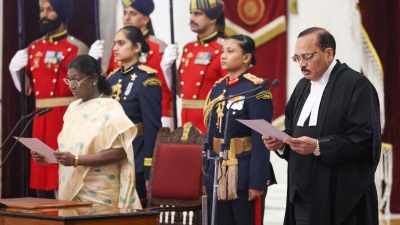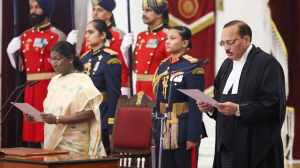Prohibition spoils the great Haryana Vikas Party
CHANDIGARH, MARCH 11: It has taken an electoral rout for the HVP-BJP alliance in Haryana to realise what was known for long: that total proh...

CHANDIGARH, MARCH 11: It has taken an electoral rout for the HVP-BJP alliance in Haryana to realise what was known for long: that total prohibition is a total failure. The alliance leaders now blame prohibition for the loss of five of the seven seats they held in the last Lok Sabha.
Even Chief Minister Bansi Lal seems inclined to dismount his hobby-horse. “Personally, I do not think prohibition has failed”, he said, but added, “Its future will be decided after a consensus on the issue” within the alliance. Alliance leaders will meet shortly to discuss the issue.
The views of the alliance MLAs were summed up by a minister, who remarked, “The sooner prohibition is abolished, the better. This is the only way we can regain the lost ground”. Even Bansi Lal’s son Surinder Singh wants a second look at prohibition. For, the only achievement of the 20-month campaign to banish liquor from Haryana is that no one now drinks in the open. But the cost has been very heavy. Politically, the credibility of theruling alliance is at its lowest.
Economically, prohibition has drained the state of at least Rs 1,000 crore, affecting developmental activity. On the social scene, a well-entrenched liquor mafia has emerged. And since prohibition was the government’s top priority, the administration wasted much effort and time doing something which was impracticable.
All this because no attempt was made to study the feasibility of total prohibition, or its likely fall-out, before taking the plunge. Chief Minister Bansi Lal proclaimed that the alliance’s electoral victory in 1996 was a mandate for total prohibition and went ahead with it.
Many had reservations about its success, as every single district in Haryana shared a border with a wet state and liquor was the second biggest source of revenue. Today, liquor is easily available in most of the state, and the cost isn’t too high either.
Initially, the government decision evoked a good response. The traditional Haryanvis, who had watched with unease the unpleasantconsequences of liquor increasingly becoming a status symbol, welcomed prohibition.
The police also, as if fired by a new zeal, seized large stocks of liquor being transported into the state. But, the smugglers started getting organised. Before long, the euphoria evaporated. Big seizures became rare. Armed encounters with smugglers stopped. But liquor kept pouring in. It is generally believed that police and the smugglers made peace for mutual benefit.
Looking for easy money, unemployed youths, women and, at certain places, even school boys took to carrying liquor. In the last 20 months, about one lakh cases of violation of excise laws were registered. But, an overwhelming majority of those involved were small offenders. The big sharks got away.
Along with smuggling, spurious distillation increased, particularly in areas like Kaithal, Kurukshetra, Assandh, Nissing, the riverine belt along the Ghaggar and the Yamuna. About 50 persons have since died after consuming poisonous stuff.
Facing criticism,the government responded by making harsh laws. One such law provides for confiscation of a vehicle if anyone in it was found carrying liquor. Under this law, about 700 vehicles, including buses of Delhi, Punjab, Himachal Pradesh and also Haryana, have been confiscated, just because one or two passengers were carried liquor.
Nothing damaged state credibility like the involvement of influential people in excise cases. Among them were relatives of HVP general secretary Ved Pal and Sports Minister Ram Saroop Rama. Bansi Lal tried to convince the people that this showed the government meant business.
But few were convinced. For, there were instances when the wrong-doer got away and the honest suffered. A politically well-connected DSP in Rohtak district was found hand in glove with liquor smugglers, but got away with a transfer.
Estimates of the loss to the state vary, but the minimum figure being mentioned is Rs 1,000 crore. Actually, the loss may be much higher, if one takes into account the loss of jobsin the liquor trade, the crippling effect on the hotel and tourism.
Incidently, one of the factors that contributed to the defeat of the alliance was power shortage.
As an officer pointed out, with Rs 1,000 crore the state could have generated 250 MW of power, which would have considerably eased the power situation. Now its back to the World Bank.





- 01
- 02
- 03
- 04
- 05


























